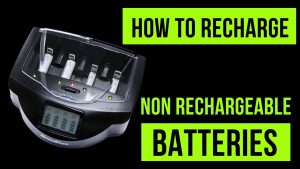Do Rechargeable Batteries Go Bad? rechargeable batteries have become increasingly popular in recent years, as people look for more sustainable and cost-effective ways to power their devices.
However, there are still many questions surrounding the use and maintenance of rechargeable batteries. In this article, we’ll answer some of the most frequently asked questions about rechargeable batteries.
In This Article
1. Do Rechargeable Batteries Go Bad?
Yes, rechargeable batteries can go bad over time. Most rechargeable batteries have a limited lifespan, and they will eventually lose their ability to hold a charge. The lifespan of a rechargeable battery depends on many factors, including the type of battery, how often it is used, and how it is stored.
2. Do Rechargeable Batteries Hold Their Charge?
Rechargeable batteries do not hold their charge as well as non-rechargeable batteries. Over time, the battery will lose some of its charge even when not in use. The amount of charge loss varies depending on the type of battery and how it is stored.
3. Do Rechargeable Batteries Go Bad If Not Used?
Yes, rechargeable batteries can go bad if they are not used for an extended period of time. This is because the battery’s internal chemistry can break down over time, causing it to lose its ability to hold a charge.
4. Do Solar Rechargeable Batteries Go Bad?
Yes, solar rechargeable batteries can go bad over time. Like other rechargeable batteries, the lifespan of a solar rechargeable battery depends on many factors, including the type of battery, how often it is used, and how it is stored.
5. Is A Solar Battery The Same As A Rechargeable Battery?
Yes and no. A solar battery is a type of rechargeable battery that is specifically designed to be charged using solar energy. However, not all rechargeable batteries are designed for use with solar panels.
6. Do Rechargeable Batteries Leak?
Rechargeable batteries can leak if they are not used or stored properly. The risk of leakage increases as the battery gets older and reaches the end of its lifespan. To prevent leakage, it is important to store rechargeable batteries in a cool, dry place and to replace them when they begin to show signs of wear and tear.
Trending Today
7. Do Rechargeable Batteries Have A Memory?
No, modern rechargeable batteries, such as Lithium-ion batteries, do not have a memory effect.
Memory effect is a phenomenon that can occur in older types of rechargeable batteries, such as Nickel-Cadmium (NiCad) batteries, where the battery “remembers” the capacity it was last charged to and only allows charging up to that level, leading to a reduction in overall capacity. However, modern rechargeable batteries, including Lithium-ion batteries, are not susceptible to memory effect.
8. Do Rechargeable Batteries Leak?
Yes, rechargeable batteries can leak, although it is less common than with non-rechargeable batteries.
The leakage of a rechargeable battery occurs when the seal of the battery breaks down, allowing the electrolyte solution to leak out. The electrolyte is a chemical solution that is necessary for the battery to function, and it can be acidic or alkaline depending on the type of battery. When the electrolyte leaks out of the battery, it can damage the device the battery is installed in, as well as pose a potential health hazard if it comes into contact with skin or eyes.
9. How Long To Charge Rechargeable Batteries The First Time?
The time it takes to charge rechargeable batteries for the first time depends on the type of battery and the charger being used.
For most rechargeable batteries, it is recommended to fully charge them before using them for the first time. The time it takes to fully charge a battery depends on several factors, including the capacity of the battery, the charging current of the charger, and the charging status of the battery when it is first inserted into the charger.
As a general rule, most rechargeable batteries will take several hours to fully charge, although some may take longer. For example, Lithium-ion batteries may take 2-4 hours to fully charge, while Nickel-Metal Hydride (NiMH) batteries may take 4-6 hours or more to fully charge.
10. Do Rechargeable Batteries Wear Out
Yes, rechargeable batteries do wear out over time due to a phenomenon called “cycle degradation.” Each time a rechargeable battery is charged and discharged, it undergoes a chemical reaction within its cells. Over many charge-discharge cycles, the materials inside the battery degrade, leading to a decrease in the battery’s capacity to hold a charge.
Conclusion
It is important to refer to the manufacturer’s instructions for specific charging times and procedures for your particular battery and charger. It is also important to avoid overcharging rechargeable batteries, as this can cause them to overheat and reduce their overall lifespan.





















